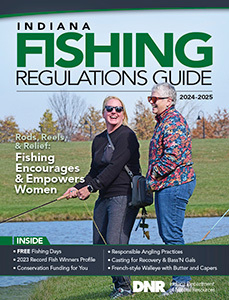Fish Identification
Sunfish
Bluegill
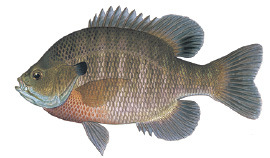
5 to 9 vertical bars on sides, black opercular flap (ear) with no margin, dark spot at rear of dorsal fin.
Redear
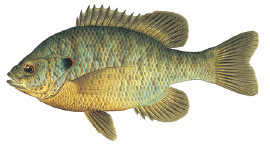
Opercular flap (ear) is tipped with red or orange margin.
Black Crappie
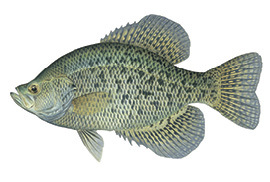
7 to 8 dorsal spines, random blotches on sides.
White Crappie
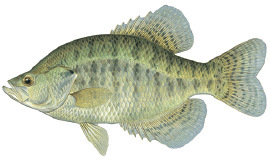
6 dorsal spines, black side markings form vertical bars rather than random spots.
Black Bass
Largemouth Bass
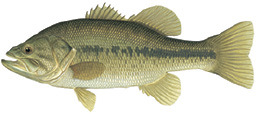
Upper jaw extends beyond back of eye.
Smallmouth Bass
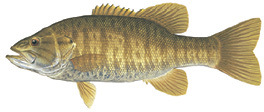
Upper jaw does not extend beyond back of eye.
Spotted Bass

Red eye, horizontal lines of dark spots on lower sides, upper jaw does not extend beyond back of eye.
True Bass
Hybrid Striped
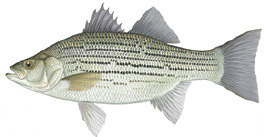
Two tooth patches on back of tongue are joined, first stripe below lateral line complete to tail, stripes above lateral line usually broken.
White Bass
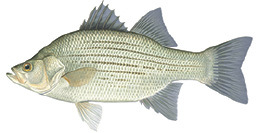
Single tooth patch on back of tongue, first stripe below lateral line not complete to tail.
Striped Bass
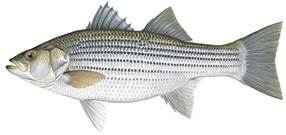
Tooth patches on back of tongue in two parallel patches, first stripe below lateral line complete to tail, stripes above lateral line are unbroken.
Catfish
Blue Catfish
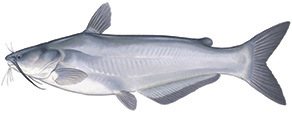
30 to 35 anal fin rays, anal fin margin is straight, caudal fin is deeply forked.
Channel Catfish

24 to 29 rays in rounded anal fin, caudal fin is deeply forked, dark spots on sides when young.
Flathead Catfish

14 to 17 anal fin rays, caudal fin slightly rounded or slightly notched.
Perch
Yellow Perch
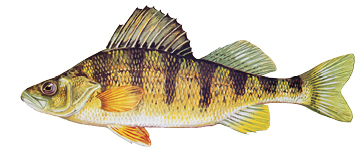
Green back, yellow-green sides marked by 6 to 8 darker vertical bars, white belly, pale orange fins.
Sauger
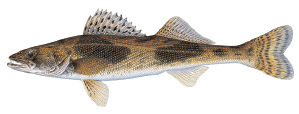
3 or 4 saddle shaped blotches on back and sides, spotted dorsal fin.
Walleye
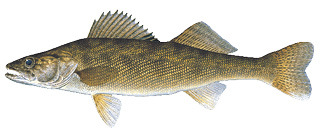
No spots on dorsal fin, dusky spot at rear of spiny dorsal fin, lower tip of tail and anal fin are white.
Salmon
Chinook Salmon or King Salmon
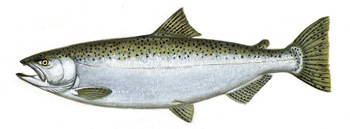
Teeth are set in dark gums, black spots on back and both lobes of square caudal fin, 15 to 17 anal fin rays.
Coho Salmon
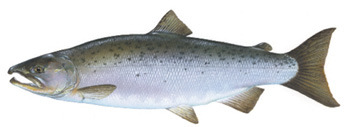
Teeth are set in light color gums, black spots on upper lobe of slightly forked caudal fin, 12 to 15 anal fin rays.
Trout
Brown Trout
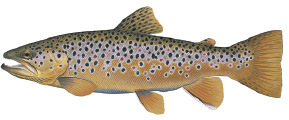
White mouth, teeth and gums; caudal fin margin square with no spots on upper or lower lobe; stream dwelling browns possess some orange/red spots on sides; resident brown trout in Lake Michigan possess black X-shaped markings on sides.
Rainbow Trout or Steelhead
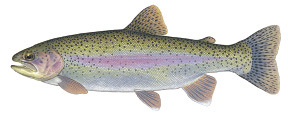
White mouth, teeth and gums; small black spots on back, sides, caudal and dorsal fins, caudal fin margin is square; 9 to 12 anal fin rays.
Lake Trout
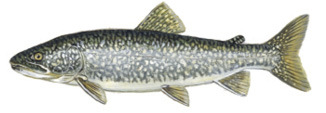
White mouth, teeth and gums; caudal fin deeply forked, body color light to dark gray with light spots.
Northern Pike & Muskellunge
Northern Pike

Elongated body and head with tooth-filled mouth shaped like a duck bill; white belly with green to yellow sides featuring rows of lighter horizontal spots or streaks. Coloration can vary depending on habitat — light green from lake to dark green from river.
Muskellunge

Elongated body and head with tooth-filled mouth shaped like a duck bill; coloration varies but typically dark vertical bar markings on green or brown background.
Fish Identification Form
Caught a fish and need help identifying the species?
If you have caught a fish and cannot
determine what species it is, we can help. Email a photo of the fish to [email protected]. Visit fishing.IN.gov for more information.
Unless noted, all illustrations by Rick Hill, Kentucky Department of Fish & Wildlife.
Illustrations of coho salmon, northern pike courtesy of © Tim Knepp/ USFWS
Illustrations of chinook salmon and lake trout by © Virgil Beck, courtesy of Wisconsin DNR

